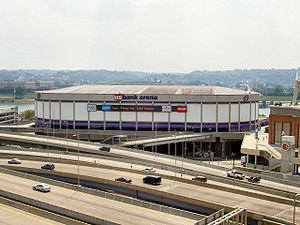
1979 The Who concert disaster
Encyclopedia

The Who
The Who are an English rock band formed in 1964 by Roger Daltrey , Pete Townshend , John Entwistle and Keith Moon . They became known for energetic live performances which often included instrument destruction...
concert disaster
took place at the Riverfront Coliseum in Cincinnati, Ohio
Cincinnati, Ohio
Cincinnati is a city in the U.S. state of Ohio. Cincinnati is the county seat of Hamilton County. Settled in 1788, the city is located to north of the Ohio River at the Ohio-Kentucky border, near Indiana. The population within city limits is 296,943 according to the 2010 census, making it Ohio's...
on 3 December 1979, as part of the band's U.S. tour
The Who Tour 1979
The Who Tour 1979 was The Who's first concert tour since the death of original drummer Keith Moon, supporting their 1978 album Who Are You.-History:...
, the first in three years. That performance was marred by tragedy
Tragedy (event)
A tragedy is an event in which one or more losses, usually of human life, occurs that is viewed as mournful. Such an event is said to be tragic....
when eleven fans (Peter Bowes, 18; Teva Ladd, 27; David Heck, 19; Connie Burns, 18; James Warmoth, 21; Bryan Wagner, 17; Karen Morrison, 15; Jacqueline Eckerle, 15; Walter Adams, Jr., 22; Stephan Preston, 19; Phillip Snyder, 20) were killed by compressive asphyxia and several dozen others injured in the rush for seating at the opening of a sold-out concert.
Attending the performance were a total of 18,348 ticketed fans (3,578 reserved seats, 14,770 general admission seats). The concert was using "festival seating
Festival seating
In live entertainment, there are several possible schemes for the seating assignment of spectators. There are several schemes which are most commonly used, though there are no hard and fast rules and alternate or modified schemes are sometimes used as is suitable to the event.-Reserved seating:In a...
", (also known as "general seating"), where the best seats are available on a first-come, first-served
First-come, first-served
First-come, first-served – sometimes first-in, first-served and first-come, first choice – is a service policy whereby the requests of customers or clients are attended to in the order that they arrived, without other biases or preferences. The policy can be employed when processing sales orders,...
basis. Due to the festival seating, many fans arrived early. When the crowds waiting outside in bitter cold conditions heard the band performing a late sound check, they thought that the concert was beginning and tried to rush into the still-closed doors. Some at the front of the crowd were trampled as those pushing from behind were unaware that the doors were still closed. Only a few doors were in operation that night, and there are reports that management did not open more doors due to union restrictions and the concern of people sneaking past the ticket turnstiles.
The band members would later find out about the incident after their performance ended. Soon after the tragedy, the victims' families sued the band, promoter, and the city until the lawsuit was settled. The result was that festival seating was banned in Cincinnati for 25 years, with minor exceptions.
This incident was the subject of a second season episode of WKRP in Cincinnati
WKRP in Cincinnati
WKRP in Cincinnati is an American situation comedy that featured the misadventures of the staff of a struggling fictional radio station in Cincinnati, Ohio. The show was created by Hugh Wilson and was based upon his experiences working in advertising sales at Top 40 radio station WQXI in Atlanta...
called "In Concert."

